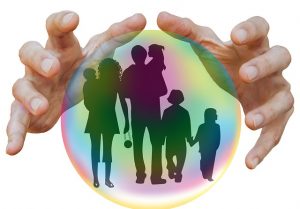
Depression and anxiety are common in fathers during the perinatal period (from conception to 1 year following birth). We know that about 5-10% of men experience clinical depression during this period (Paulson et al, 2010), and 5-15% are affected by anxiety disorders (Leach et al, 2016).
The children of these fathers have an increased risk of emotional or behavioural difficulties, whether or not their mother is affected by perinatal mental problems (Ramchandani et al, 2008; Ramchandani et al, 2005).
Research evidence supports something that we know intuitively, that fathers’ positive involvement in family life leads to less chance that their children will experience emotional or behavioural difficulties, even if their mother is affected by depression (Chang et al, 2007; Mesuliz et al, 2004).
Men and women express their psychological stress in very different ways and are much less likely to get help for their problems from health services (Robertson et al, 2015).
We really know very little about postnatal depression in dads because very little research has been done; according to this study there is only one previous study that focused specifically on dads with depression (Edhborg et al, 2015). The research that has been done says that it’s “vague and difficult to detect” (Hammarlund et al, 2015) so this is clearly an area crying out for better evidence.
I have personal experience of depression and anxiety myself, having recently recovered from a year long episode that coincided with the birth of our third child. A couple of weeks ago I was invited to participate in a #DadsMHhour chat on Twitter, and the invite from Mark Williams (@MarkWilliamsFMH) coincided with a new qualitative study landing on my desk. What better chance (I thought) than to summarise this new research on fathers’ views and direct experiences of paternal perinatal mental health, and also write about my own recent experiences. Here goes…

Fathers’ positive involvement in family life leads to less chance that their children will experience emotional or behavioural difficulties, even if their mother is affected by depression.
Methods
This new research paper (Darwin et al, 2017) is an interpretive qualitative study, which simply means that a team of researchers interviewed a carefully selected group of men and asked them their views and personal experiences of mental health during the perinatal period.
The men in the study were all part of an existing cohort called the Born and Bred in Yorkshire (BaBY) group. The eligibility criteria for the research was simple:
- Baby born within the last 12 months
- Men had completed various Mental Health and Wellbeing questionnaires to measure their levels of depression, anxiety and threatening life events (PHQ-8, GAD-7, PHQ-15, LTE)
Forty two men expressed an interest in being involved and the research team purposively sampled this group to make sure that a diverse range of MHWB scores were included. The final study included 19 men aged 25-44 years. In- depth interviews were carried out 5-10 months after the birth of their child. The majority were first-time fathers born in the UK, all lived with their partner. A common technique called thematic analysis was used to draw out the main themes of the group.
Results
The research identified four main themes:
1. Legitimacy of paternal stress and entitlement to health professionals’ support
Unsurprisingly, men didn’t use mental health language (depression, anxiety) to describe their state of mind during the perinatal period. They tended to speak about ‘stress’, which they said was much greater during the postnatal period when their new baby brought many joys, but also lots of strains (lack of sleep, altered relationship with their partner, loss of former life). A stand-out quote for me from the paper (and there are lots of them) is this one:
I think for me it’s just – the never having any time to relax, it’s just not possible. I’ve got a stressful job then I come home and I tend to get … the tired, stressed baby … I think the stress for me is just the non-stop-ness of it (Father 12)
Men tended to gloss over their own problems and focus instead on the difficulties that their partners were facing. This kind of ‘she’s got it a lot worse than me’ attitude is an important early stage for men in not accepting that they have a problem and need some help to sort it out.
Men found it difficult to tease out the differences between their symptoms of tiredness and their mental stress. Those first few weeks of being a dad are such an emotional rollercoaster that it’s understandably hard to be aware of mental health difficulties as they emerge, especially if we have no framework or language to describe them (or even if we do!).
Being excluded from services and conversations was a common theme. Men felt that they were unsure of their role during the birth and “felt a bit more like a spare part”.

Fathers questioned their entitlement to support, noting that services are pressured and ‘should’ be focused on mothers.
2. Protecting the partnership
We all know that the relationship between a couple changes dramatically when children arrive. This study found that men really emphasised the perceived need to be the ‘protector’; protecting their partnership and their relationship, as well as the new family unit.
Interestingly, most men continued to view their partner as their main source of support, even though in many cases they felt that the new arrival meant they had a lot less time for each other as a couple.
Of course many new dads had to support a partner who was herself going through a tough emotional time. Up to 20% of women develop a mental health problem during pregnancy or within a year of giving birth (Bauer et al, 2014), and many men in the study said how hard they found it to know what to do to support them. Team work was seen as a fundamental requirement for getting through the journey together.

Men emphasised the perceived need to be the ‘protector’; protecting their partnership and their relationship, as well as the new family unit.
3. Navigating fatherhood
Most men avoided conversations about mental ill health and instead focused on what worked to reduce stress and improve their resilience. The concept of a ‘good father’ came up again and again, which for most men meant being a 21st century ‘provider’ and ‘protector’, taking a proactive hands-on role with the baby and giving both practical and emotional support to their partner.
Some of the stress felt by dads came from failing to meet an unrealistic expectation of what being a ‘good father’ actually means; perhaps fuelled by media portrayals of perfect parents. I found the sensible quotes from realistic parents so important and refreshing:
Even though it wasn’t by the book, but it made our lives a lot easier and that I think helped as well, not listening to what everyone told us (Father 6)
We felt this pressure building up the more we read, so that’s why we said, like, just trust our instincts (Father 19)
An interesting sub-theme emerged around managing stress through distraction, denial and release. Many men felt that their tried and tested coping strategies just didn’t work with this new life situation, which left them feeling very unsure about how to deal with their emotional state. Many used work, sport or other task-orientated strategies to relieve stress and make them feel more in control.
The importance of ‘father-baby’ time was highlighted by many as vital to achieve bonding with their new child, and to mitigate against the feeling of being excluded from the mother-baby unit and being rejected by their partner.

Men highlighted supporting their partner and protecting their partnership as fundamental to navigating fatherhood.
4. Diversity of men’s support networks
Many men reflected on the support that was available to their partner (family, friends, networks, health services, and the wider community) and complained about the lack of support available to them as new dads. New mums (certainly those living in urban environments) are often very well served by a range of support (baby groups, play cafés, social media groups etc) but there is a real lack of similar groups for new dads.
I wouldn’t have a clue how to go about [accessing groups for fathers]. … with [partner], she can go online and find 28 different chat rooms … I don’t know if those things even exist [for fathers] and I wouldn’t know where to look. (Father 1)
However, it’s very possible that men would prefer something different from new mums; not ‘gendered’ baby events, but rather more informal support.
You know we do talk to each other about parenting stuff but … it’s never a serious conversation, it’s all, done over a beer you know and a few jokes, which is good. (Father 1)
The study found that some men did not feel comfortable accessing traditional groups to get this kind of support and may in fact prefer more written materials to learn. A fathers’ version of the bounty pack (an information pack provided to mothers in England) was mentioned by one dad as a possibility.

Compared with new mums, new dads are poorly served by support networks and appropriate informal emotional help.
Conclusions
- Mothers AND fathers both find the perinatal period a difficult and stressful time and they need different kinds of help and support to get them through it
- New dads may be reluctant to express their support needs or seek help and they may question the legitimacy of their psychological experiences
- Focusing on their partners practical and psychological needs and feeling excluded from over-stretched services may compound this tendency to not seek help
- Men need tailored and targeted resources that focus on stress, resilience, fatherhood and behaviours (rather than exclusively mental health and ‘symptoms’)

Men need tailored and targeted resources that focus on resilience and fatherhood.
Strengths and limitations
This is a much needed and very welcome study in a massively under-researched area. Well done to the team from the Universities of Leeds, York, Sheffield and Hull who collaborated on this piece of work. I hope that it inspires other researchers (and perhaps more importantly research funders) to take paternal perinatal mental illness seriously and evaluate a range of approaches to improve detection, management and treatment of depression, anxiety and other mental health conditions in new dads.
There are a number of limitations of this study worth mentioning:
- The sample size was too small and data saturation was not achieved. Future studies should aim to include more men and ensure that the full range of views and experiences are gathered.
- Interviewing fathers 5-10 months after the birth of their child was probably too late to detect many of the most stressful experiences. A longitudinal approach is needed in future studies, with interviews being carried out regularly by the same research team, e.g. 1 month after birth, 3-months after, 6 months after, 12 months after. This reflects my own experience of a depressive episode, which began shortly after my daughter was born and was worst after 3 months, but also around a year after her birth.
- The study relied on self-report measures of depression and anxiety, which may not have been accurate.
- There was a lack of diversity in the sample, with very little ethnic or socioeconomic mix, so further work is clearly needed in a broader population.
- Same-sex couples were excluded from this study, and it’s worth highlighting that there’s a real dearth of evidence in this field. Same-sex couples can have major difficulties accessing support, especially gay fathers who are potentially excluded from both mothers groups and men’s support networks. The urgent need for work in this population is clear, especially when we bear in mind the additional challenges often faced by same-sex couples who may have adopted children with complex needs.
My own reflections
Reading this paper was like reading a diary that I never wrote because I was too stressed, depressed and exhausted. There was a huge amount of testimony in the included quotes that I could relate to, plus quite a bit that didn’t ring true for me. I guess that’s the point though isn’t it; mental ill health is a very personal thing and although there are lots of consistent elements within depressive illness or anxiety disorders that people can agree on, there are also lots of things unique to each sufferer.
For me, the year-long episode of depression I experienced is intrinsically linked to my own self-doubt and anxiety about becoming a father again. My wife and I spent 15 years trying to have kids and when we finally had twins in 2013 it was amazing and terrifying in pretty much equal measure. Of course it was by far the hardest thing we’ve ever done, but it felt like we were doing it well as a couple.
When our third child came along I felt much less prepared and I sought solace in work (something I’m good at) and played a much less proactive role as a father. As a result, it took a lot longer to bond with my child and that lack of emotional connection compared to my other kids just fed my anxiety and sent me into a spiral of depression.
My conclusion looking back is that postnatal mental illness in fathers is incredibly complex and the solutions felt to me like plate-spinning. Trying to prioritise my life was impossible when the competing demands were laced with so much fear and guilt. The only path that seemed feasible was to retreat into myself, put on my headphones, not confront the inevitable reality that I was ill. It was only when life became impossibly difficult that I accepted that I had to see a doctor and get some kind of intervention.
In the end what worked for me was a combination of admitting that I needed to be rescued, letting people support me and starting to help myself, exercise, antidepressants, music, counselling, dogs and family (although maybe not in that order). I certainly don’t feel stable or recovered yet. In fact, it feels most days like I could slide back into the blackness, but I do feel like I’ve taken some fundamental psychological steps forward, without which I could never have started to get well.
What would have helped me most I think would have been sharing experiences with other men like me. Personally I found it quite difficult finding those peers when I needed them, partly because of my lifelong social anxiety, partly because of my depressive illness, but perhaps mostly because the support networks just weren’t in place.
Fortunately for me, my family have been all the support I’ve needed to get me onto the right path. It also helps that all three of my children are overwhelmingly wonderful. Loving them and being loved back is powerful medicine indeed!

Links
Primary paper
Darwin Z, Galdas P, Hinchliff S, Littlewood E, McMillan D, McGowan L, Gilbody S, and on behalf of the Born and Bred in Yorkshire (BaBY) team (2017) Fathers’ views and experiences of their own mental health during pregnancy and the first postnatal year: a qualitative interview study of men participating in the UK Born and Bred in Yorkshire (BaBY) cohort. BMC Pregnancy and Childbirth. 2017;17:45. doi:10.1186/s12884-017-1229-4.
Other references
Bauer A, Parsonage M, Knapp M, Iemmi V, Adelaja B. (2014) Costs of Perinatal Mental Health Problems. London School of Economics and Political Science [PDF]
Chang JJ, Halpern CT, Kaufman JS. (2007) Maternal depressive symptoms, father’s involvement, and the trajectories of child problem behaviors in a US national sample. Arch Pediatr Adolesc Med. 2007;161(7):697–703.
Edhborg M, Carlberg M, Simon F, Lindberg L. (2015) “Waiting for Better Times” Experiences in the First Postpartum Year by Swedish Fathers With Depressive Symptoms. Am J Mens Health. 2015:10.1177/1557988315574740. [PubMed abstract]
Hammarlund K, Andersson E, Tenenbaum H, Sundler AJ. (2015) We are also interested in how fathers feel: A qualitative exploration of child health center nurses’ recognition of postnatal depression in fathers. BMC Pregnancy Childbirth. 2015;290. doi:10.1186/s12884-015-0726-6.
Leach LS, Poyser C, Cooklin AR, Giallo R. (2016) Prevalence and course of anxiety disorders (and symptom levels) in men across the perinatal period: a systematic review. J Affect Disord. 2016;190:675–86. [PubMed abstract]
Mezulis AH, Hyde JS, Clark R. (2004) Father involvement moderates the effect of maternal depression during a child’s infancy on child behavior problems in kindergarten. J Fam Psychol. 2004;18:575–88. [PubMed abstract]
Paulson JF, Bazemore SD. (2010) Prenatal and postpartum depression in fathers and its association with maternal depression: a meta-analysis. J Am Med Assoc. 2010;303(19):1961–9.
Ramchandani P, Stein A, Evans J, O’Connor TG, ALSPAC study team. (2005) Paternal depression in the postnatal period and child development: a prospective population study. Lancet. 2005;365:2201–5. [PubMed abstract]
Ramchandani P, O’Connor TG, Evans J, Heron J, Murray L, Stein A. (2008) The effects of pre- and postnatal depression in fathers: a natural experiment comparing the effects of exposure to depression on offspring. J Child Psychol Psychiatry. 2008;49:1069–78.
Robertson S, Bagnall A, Walker M. (2015) Evidence for a gender-based approach to mental health program: identifying the key considerations associated with “being male” (PDF): an Evidence Check rapid review brokered by the Sax Institute for the Movember Foundation.
Photo credits

Hi André, it’s great that you wrote this and good to hear you’re getting back on your feet. I hope your blog is widely read and shared and that it prompts some conversations. It seems to me that this isn’t talked about, yet I imagine it must be rather common. The phrase that stood out for me, for its wider applicability, is your comment “The solutions felt to me like plate-spinning”. This is true, I think, of what is demanded of people in many health contexts and certainly in the work of managing long-term conditions; something healthcare professionals need to be aware of. I hope we’ll see more research on the perinatal mental health of fathers and that it will address some of the gaps you’ve highlighted.
Wonder about birth trauma related PTSD and later life impact. Myself and my partner have spent many years with undiagnosed PTSD that added to earlier adverse childhood experience. Do you know of any support or research around this as we want to collaborate? Thanks to all the elves… this is great stuff.
[…] broad on other inclusion criteria. If you’re interested in paternal PND I can recommend a recent blog by André Tomlin. Furthermore, the outcomes of this recent study protocol for a systematic review of preventive […]
[…] very own Papa Elf has blogged about his experience of being a new Dad with postnatal depression, and gives some insight into the coping mechanisms fathers’ use, such as spending more time on […]
[…] know that about 5-10% of men experience clinical depression during the perinatal period (Paulson et al, 2010), and 5-15% are affected by anxiety disorders […]
Just started researching why I feel down with zero enthusiasm for the IVF child my other half is expecting. An interesting read and I hope to use the articles to get back on track. My biggest fear is the dislike of babies/infants and do not want to be involved.